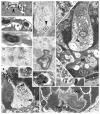Molecular cross-talk between Helicobacter pylori and human gastric mucosa
- PMID: 21472096
- PMCID: PMC3070011
- DOI: 10.3748/wjg.v17.i11.1383
Molecular cross-talk between Helicobacter pylori and human gastric mucosa
Abstract
Helicobacter pylori (H. pylori) has co-evolved with humans to be transmitted from person to person and to colonize the stomach persistently. A well-choreographed equilibrium between the bacterial effectors and host responses permits microbial persistence and health of the host, but confers a risk for serious diseases including gastric cancer. During its long coexistence with humans, H. pylori has developed complex strategies to limit the degree and extent of gastric mucosal damage and inflammation, as well as immune effector activity. The present editorial thus aims to introduce and comment on major advances in the rapidly developing area of H. pylori/human gastric mucosa interaction (and its pathological sequelae), which is the result of millennia of co-evolution of, and thus of reciprocal knowledge between, the pathogen and its human host.
Keywords: Bacterial virulence factors; CagA; Gastric diseases; Gastric mucosa; Helicobacter pylori; Pathogen/host interaction; VacA.
Figures






References
-
- Everhart JE. Recent developments in the epidemiology of Helicobacter pylori. Gastroenterol Clin North Am. 2000;29:559–578. - PubMed
-
- Zarrilli R, Ricci V, Romano M. Molecular response of gastric epithelial cells to Helicobacter pylori-induced cell damage. Cell Microbiol. 1999;1:93–99. - PubMed
-
- Herszényi L, Tulassay Z. Epidemiology of gastrointestinal and liver tumors. Eur Rev Med Pharmacol Sci. 2010;14:249–258. - PubMed
-
- Herrera V, Parsonnet J. Helicobacter pylori and gastric adenocarcinoma. Clin Microbiol Infect. 2009;15:971–976. - PubMed
-
- Correa P, Piazuelo MB, Camargo MC. The future of gastric cancer prevention. Gastric Cancer. 2004;7:9–16. - PubMed
Publication types
MeSH terms
Substances
LinkOut - more resources
Full Text Sources
Medical

